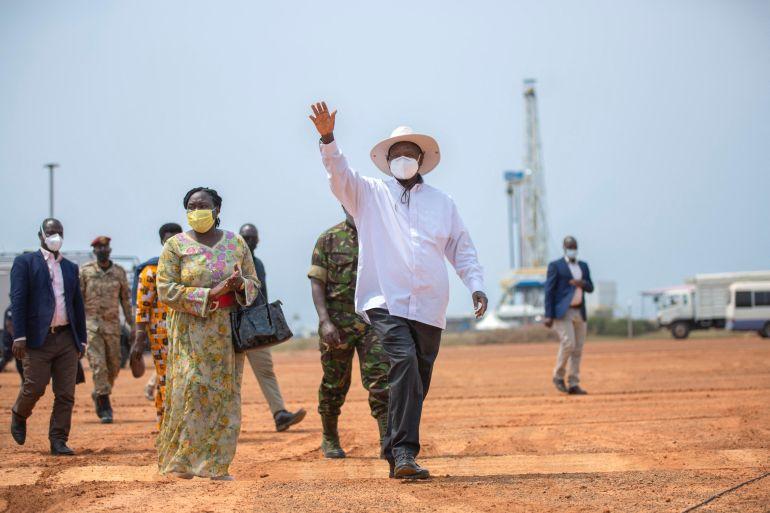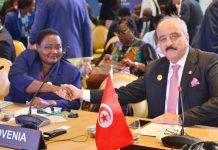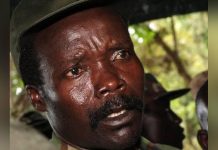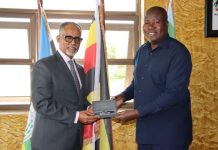Faridah n Kulumba
Africa-Press – Uganda. The Democratic Republic of Congo (DRC) the latest member to join the East African Community (EAC) on the 9th of this month revealed that the country begun dialogues with neighbouring country Uganda to have possible use of the East African country’s planned Crude Pipeline (EACOP) to export petroleum.
According to the statement made by DR Congo’s Ministry of Hydrocarbons on its Twitter handle, Dr. Congo’s Minister Didier Budimbu had a meeting with Uganda’s Minister of Energy Ruth Nankabirwa Ssentamu where they discussed issues concerning access to the pipeline.
Access Recognition
DR Congo’s Ministry added that the government of Uganda acknowledged the crucial requirement of their country to access the East African Crude Oil Pipeline (EACOP) for the transport of crude oil to be produced from the oil exploration blocks located in the Albertine Graben in DR Congo. The two countries share the oil-rich basin of Albertine.
What next is for the technical teams from Uganda and DR Congo to have a meeting where they will discuss and prepare reports which they will present to the two countries’ ministers who would then brief the countries’ Presidents Yoweri Kaguta Museveni and Felix Tshisekedi on signing a Memorandum of Understanding (MoU).
Uganda confessed
The government of Uganda through the Minister of Energy spokesperson confirmed the talks between the two nations and explained that the EACOP had been designed for potential use by Uganda’s neighbours including DR Congo and South Sudan.
Uganda’s 2007 Inter-Governmental Agreement (IGA), provides an entry for other countries to utilize the crude oil pipeline as third-party entities.
The signing of the IGA laid the foundation of other project agreements, shareholders’ agreements, and financing agreements, which are required to complement the EACOP Project. It is through these provisions that the DR Congo wou;d join.
Last year DR Congo put up for auction 30 oil and gas blocks, although environmentalists say the development of some of the blocks would open up ecologically sensitive areas and release vast amounts of carbon into the atmosphere.
About 38 civil society organizations across Tanzania and Uganda signed a letter stating that the parties involved in the construction of EACOP had failed to address environmental concerns over the pipeline and had steamrollered over the court and parliamentary process.
On 28th February this year, a French court dismissed a case filed by environmental activists requesting the court to stop TotalEnergies to construct the world’s longest-planned joint East African Crude Oil Pipeline (EACOP) Project from Uganda to Tanzania.
This was the first lawsuit of its kind filed in France, and the environmental groups had hope that it would set a legal precedent to halt 1,445-kilometer oil pipeline projects that the activists argued that it threatens to displace thousands of people and degrades critical ecosystems in the two nations.
The French court ruled that the case was “inadmissible”, saying the plaintiffs did not correctly follow court procedures against TotalEnegies company.
According to the court, the plaintiffs submitted accounts to the court in December that was “substantially different” from those that were presented to TotalEnergies in a formal notice in 2019 when the case was initiated. But the NGOs denied having substantially modified their submission to the court.
EACOP in full gear
The construction of the EACOP is in full gear. On 17 January, the government of Uganda approved the awarding of the construction license of a USD3.5 billion 1,445-kilometer pipeline that will start from oil fields in its Albertine rift basin on the western border with DR Congo to Tanzania’s Indian Ocean seaport of Tanga.
The pipeline is for transporting the discovered Uganda’s crude oil to the international market when the country starts production in 2025.
On the 21st of February Tanzania also did the same. The constructionapprovals of neighboring countries mean the oil pipeline project is irreversible.
The license was subjected to conditions including securing all necessary consents and permits. Other conditions are, the EACOP Company shall establish the main control for monitoring the oil pipeline from mid-western Uganda to Chongleani terminal at Tanzania’s Indian Ocean Tanga port, and consulting and seeking approval from authorities for any deviation from the current pipeline route, among others.
In September last year after the EU Parliament’s proposal on the oil project, President Museveni vowed that the project would proceed with or without TotalEnergies. He added that Uganda would find someone else to work with if necessary.
On 9th October, President Museveni expressed readiness to work with other progressive forces in Western Europe to avoid the emerging frustration from the European Union which is opposed to Uganda’s oil industry.
The government of Uganda is optimistic that the oil drilling project and the EACOP is the key to economic development. The authorities say oil wealth could help lift millions of people out of poverty hence increasing their standard of living. Some Ugandans see the international interference in the oil pipeline construction as an assault on the country’s sovereignty.
For More News And Analysis About Uganda Follow Africa-Press






